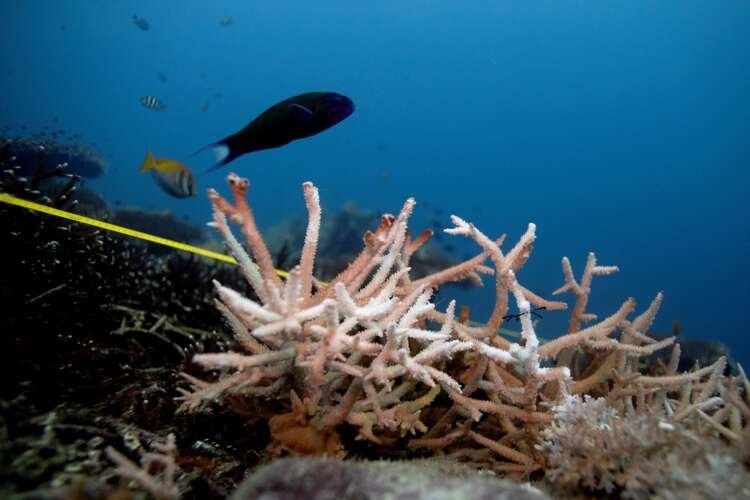Oceans are hotter, higher and more acidic, climate report warns


By Jake Spring
(Reuters) -The world’s oceans grew to their warmest and most acidic levels on record last year, the World Meteorological Organization (WMO) said on Wednesday, as United Nations officials warned that war in Ukraine threatened global climate commitments.
Oceans saw the most striking extremes as the WMO detailed a range of turmoil wrought by climate change in its annual “State of the Global Climate” report. It said melting ice sheets had helped push sea levels to new heights in 2021.
“Our climate is changing before our eyes. The heat trapped by human-induced greenhouse gases will warm the planet for many generations to come,” said WMO Secretary-General Petteri Taalas in a statement.
The report follows the latest U.N. climate assessment, which warned that humanity must drastically cut its greenhouse gas emissions or face increasingly catastrophic changes to the world’s climate.
Taalas told reporters there was scant airtime for climate challenges as other crises, such as the COVID-19 pandemic and war in Ukraine, grabbed headlines.
Selwin Hart, U.N. Secretary-General Antonio Guterres’s special adviser on climate action, criticised countries reneging on climate commitments due to the conflict, which has pushed up energy prices and prompted European nations to seek to replace Russia as an energy supplier.
DANGEROUS INCREASE
“We are … seeing many choices being made by many major economies which, quite frankly, have the potential to lock in a high-carbon, high-polluting future and will place our climate goals at risk,” Hart told reporters.
On Tuesday, global equity index giant MSCI warned that the world faces a dangerous increase in greenhouse gases if Russian gas is replaced with coal.
The WMO report said levels of climate-warming carbon dioxide and methane in the atmosphere in 2021 surpassed previous records.
Globally, the average temperature last year was 1.11 degrees Celsius above the preindustrial average – as the world edges closer to the 1.5C threshold beyond which the effects of warming are expected to become drastic.
“It is just a matter of time before we see another warmest year on record,” Taalas said.
Oceans bear much of the brunt of the warming and emissions. The bodies of water absorb around 90% of the Earth’s accumulated heat and 23% of the carbon dioxide emissions from human activity.
The ocean has warmed markedly faster in the last 20 years, hitting a new high in 2021, and is expected to become even warmer, the report said. That change would likely take centuries or millennia to reverse, it noted.
The ocean is also now its most acidic in at least 26,000 years as it absorbs and reacts with more carbon dioxide in the atmosphere.
Sea level has risen 4.5 cm (1.8 inches) in the last decade, with the annual increase from 2013 to 2021 more than double what it was from 1993 to 2002.
The WMO also listed individual extreme heatwaves, wildfires, floods and other climate-linked disasters around the world, noting reports of more than $100 billion in damages.
(Reporting by Jake Spring and Rachel More; Editing by Katy Daigle and Janet Lawrence)
Greenhouse gases are gases that trap heat in the atmosphere, contributing to the greenhouse effect and global warming. Common examples include carbon dioxide and methane.
Ocean acidification refers to the decrease in pH levels of the ocean due to the absorption of excess carbon dioxide from the atmosphere, which can harm marine life.
Sea level rise is the increase in the level of the world's oceans due to factors like melting ice caps and thermal expansion of seawater caused by global warming.
Climate change refers to significant changes in global temperatures and weather patterns over time, primarily driven by human activities such as burning fossil fuels.
A climate commitment is a pledge made by countries or organizations to reduce greenhouse gas emissions and take action to combat climate change.
Explore more articles in the Top Stories category











